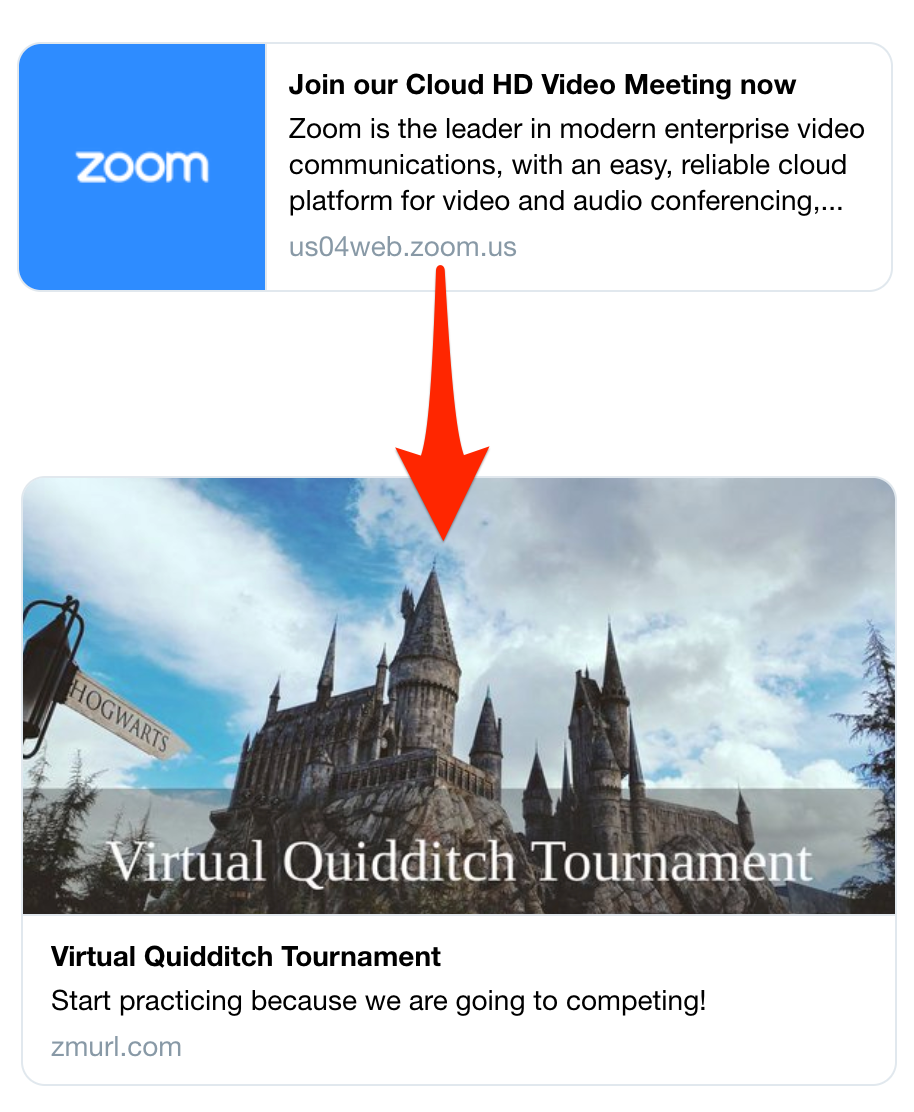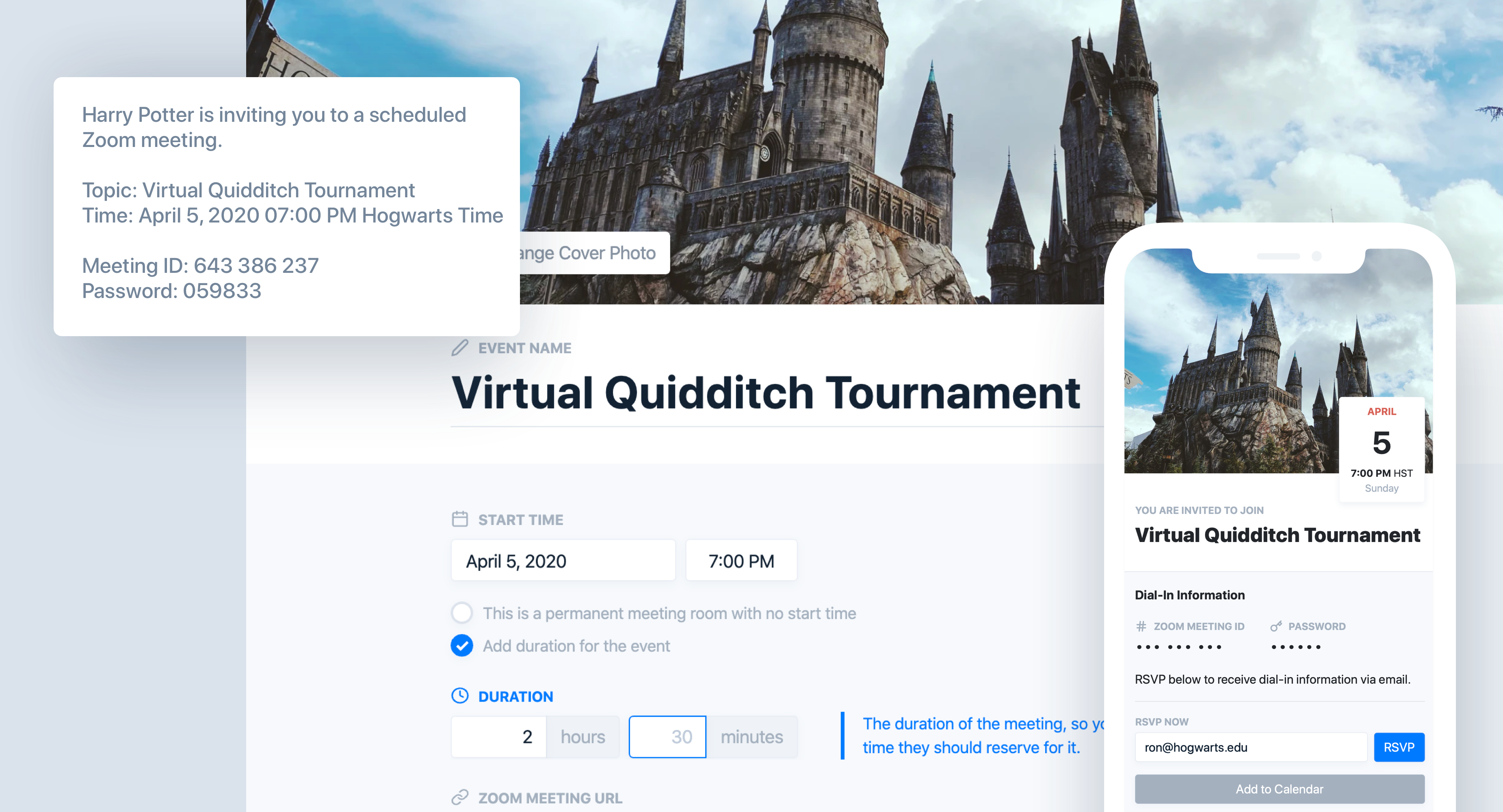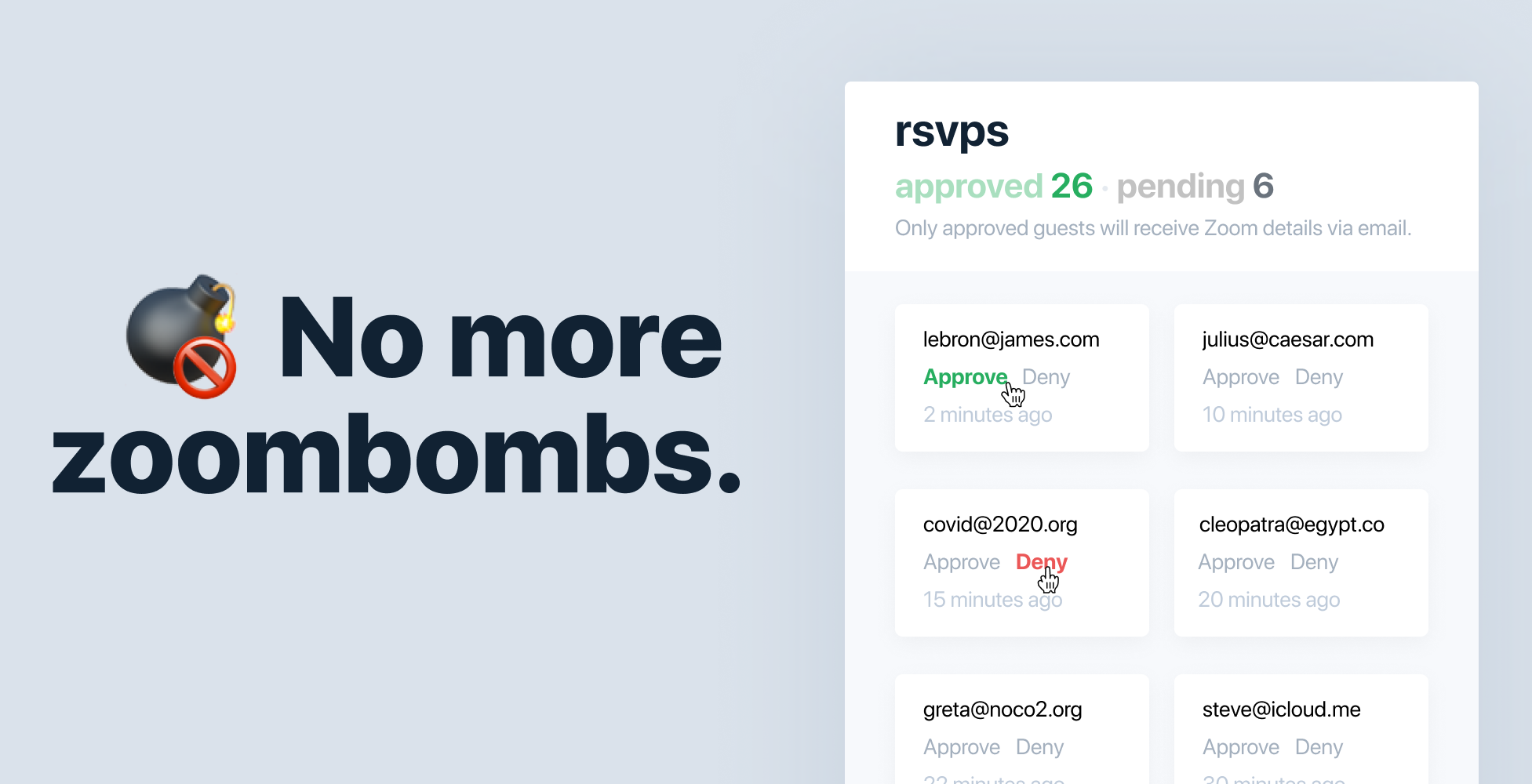Sick of sharing those generic Zoom video call invites that all look the same? Wish your Zoom link preview’s headline and image actually described your meeting? Want to protect your Zoom calls from trolls by making attendees RSVP to get your link? ZmURL.com has you covered.
Launching today, ZmURL is a free tool that lets you customize your Zoom video call invite URL with a title, explanation and image that will show up when you share the link on Twitter, Facebook or elsewhere. ZmURL also lets you require that attendees RSVP by entering their email address so you can decide who to approve and provide with the actual entry link. That could stop Zoombombers from harassing your call with offensive screenshared imagery, profanity or worse.
“We built zmurl.com to make it easier for people to stay physically distant but socially close,” co-founder Victor Pontis tells me. “We’re hoping to give event organizers the tools to preserve in-person communities while we are all under quarantine.”
Zoom wasn’t built for open public discussions. But with people trapped inside by coronavirus, its daily user count has spiked from 10 million to 200 million. That’s led to new use cases, from cocktail parties to roundtable discussions to AA meetings to school classes.
That’s unfortunately spawned new problems, like “Zoombombing,” a term I coined two weeks ago to describe malicious actors tracking down public Zoom calls and bombarding them with abuse. Since then, the FBI has issued a warning about Zoombombing, The New York Times has written multiple articles about the issue and Zoom’s CEO Eric Yuan has apologized.
Yet Zoom has been slow to adapt it features as it struggles not to buckle under its sudden scale. While it has turned on waiting rooms and host-only screensharing by default for usage in schools, most people are still vulnerable due to Zoom’s permissive settings and reused URLs that were designed for only trusted enterprise meetings. Only today did Zoom concede to shifting the balance further from convenience to safety, turning on waiting rooms by default and requiring passwords for entry by Meeting ID.
Meanwhile, social networks have become a sea of indistinguishable Zoom links that all show the same blue and white logo in the preview, with no information on what the call is about. That makes it a lot tougher to promote calls, which many musicians, fitness instructors and event producers are relying on to drive donations or payments while their work is disrupted by quarantines.

ZmURL’s founders during their only in-person meeting ever
Luckily, Pontis and his co-founder Danqing Liu are here to help with ZmURL. The two software engineers fittingly met over Zoom a year ago and have only met once in person. Pontis, now in San Francisco, had started bike and scooter rental software companies Spring and Scooter Map. Liu, from Beijing but now holed up in New York, had spent five years at Google, Uber and PlanGrid before selling his machine learning tool TinyMind.
The idea for ZmURL stemmed from Liu missing multiple Zoom events he’d wanted to attend. Then a friend of Pontis’ was laid off from their yoga instructor job, and they and their colleagues were scrambling to market and earn money from hosting their own classes over Zoom. The duo quickly built a beta, with zero money raised, and tested it with some yoga gurus who found it simplified promoting events and gathering RSVPs. “We’re all going through a tough time right now. We see ZmURL as our opportunity to help,” Pontis tells me.

To use the tool, you generate a generic meeting link from Zoom like zoom.us/ji/1231231232 and then punch it into ZmURL. You can upload an image or choose from stock photos and color gradients. Then you name your event, give it a description and set the time and date. You’ll get a shorter URL like https://zmurl.com/smy5m or you can give it a custom one like zmurl.com/quidditch.
When you share that URL, it’ll show your image, headline and description in the link preview on chat apps, social networks and more. Attendees who click will be shown a nicely rendered event page with the link to enter the Zoom call and the option to add it to their calendar. You can try it out here, zmurl.com/aloha, as the startup is hosting a happy hour today at 6pm Pacific.
Optionally, you can set your ZmURL calls to require an RSVP. In that case, people who click your link have to submit their email address. The host can then sift through the RSVPs and choose who to email back the link to join the call. If you see an RSVP from someone you don’t recognize, just ignore it to keep Zoombombers from slipping inside.

Surprisingly, there doesn’t seem to be any other tools for customizing Zoom call links. Zoom paid enterprise customers can only set up a image and logo-equipped landing page for their whole company’s Zoom account, not for specific calls. For now, ZmURL is completely free. But the co-founders are building out an option for hosting paid events that collect entry fees on the RSVP site while ZmURL takes a 5% cut.
Next, ZmURL wants to add the ability to link your Zoom account to its site so you can spawn call links without leaving. It’s also building out always-on call rooms, recurring events, organizer home pages for promoting all their calls, an option to add events to a public directory, email marketing tools and integrations with other video call platforms like Hangouts, Skype and FaceTime.
Pontis says the biggest challenge will be learning to translate more of the magic and business potential off offline events into the world of video calling. There’s also the risk that Zoom will try to intercede and force ZmURL to desist. But it shouldn’t, at least until Zoom builds all these features itself. Or it should just acquire ZmURL.
We’re dealing with an unprecedented behavior shift due to shelter-in-place orders that threaten to cripple the world economy and drive many of us crazy. Whether for fostering human connection or keeping event businesses afloat, Zoom has become a critical utility. It should accept all the help it can get.

Recent Comments